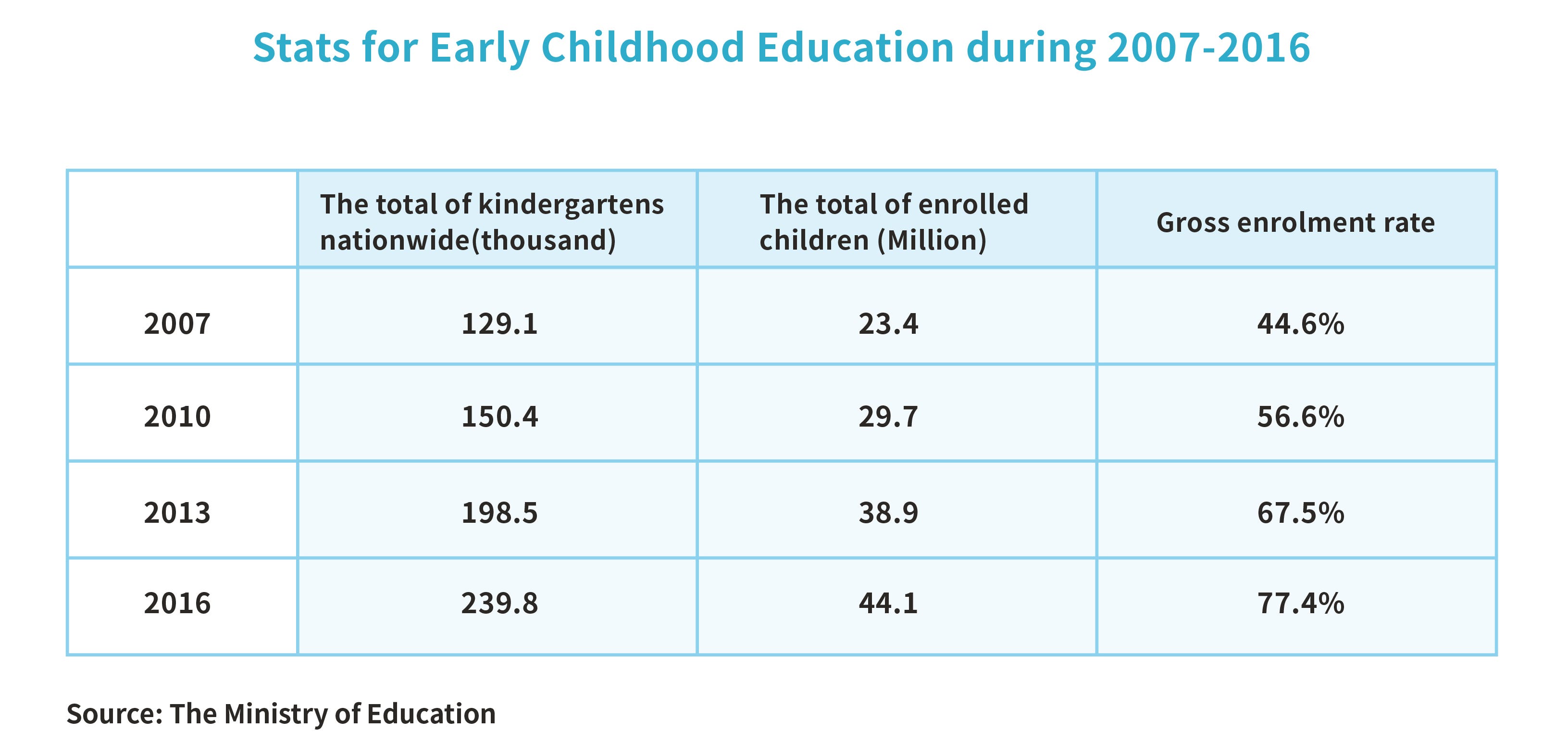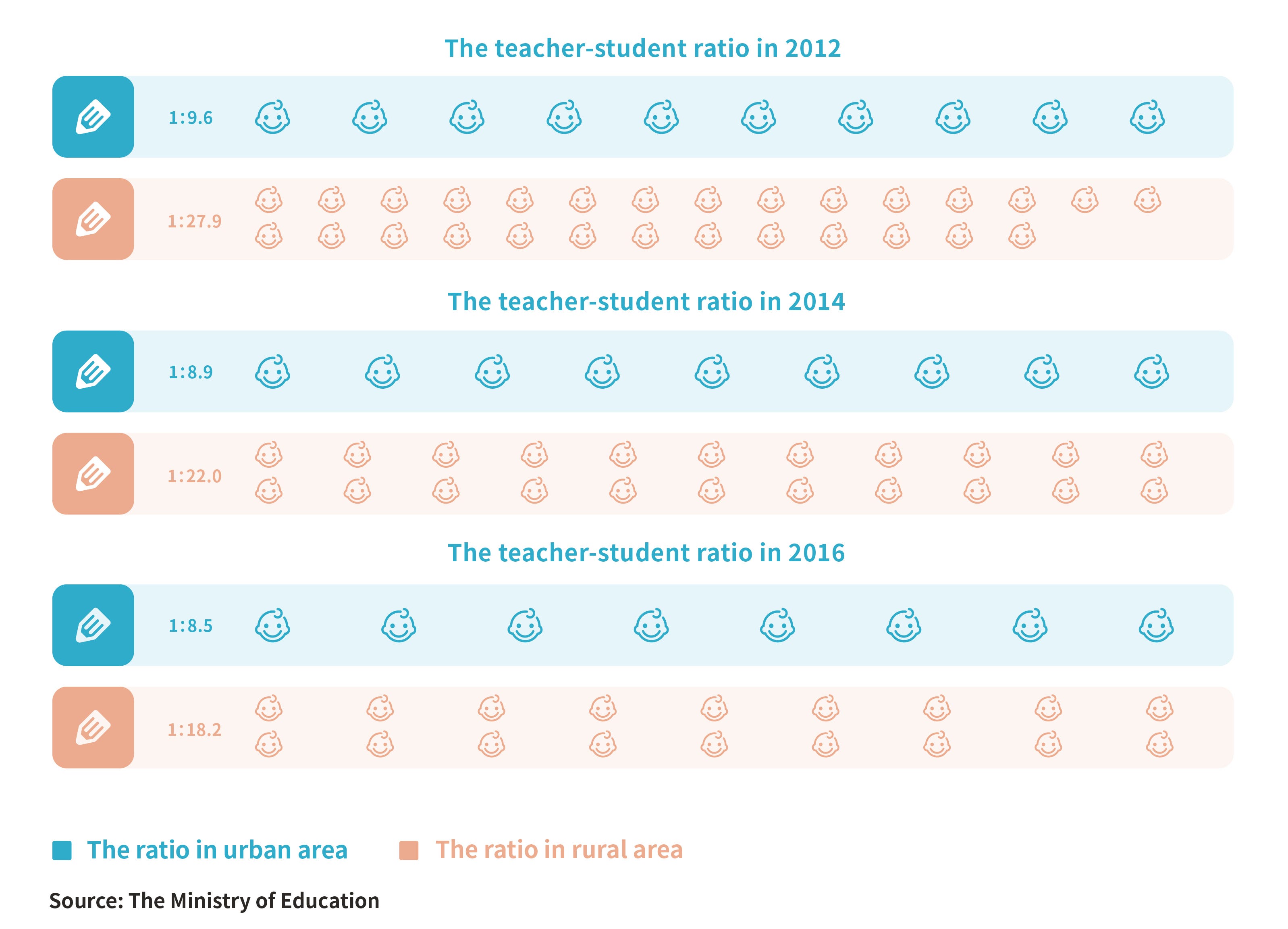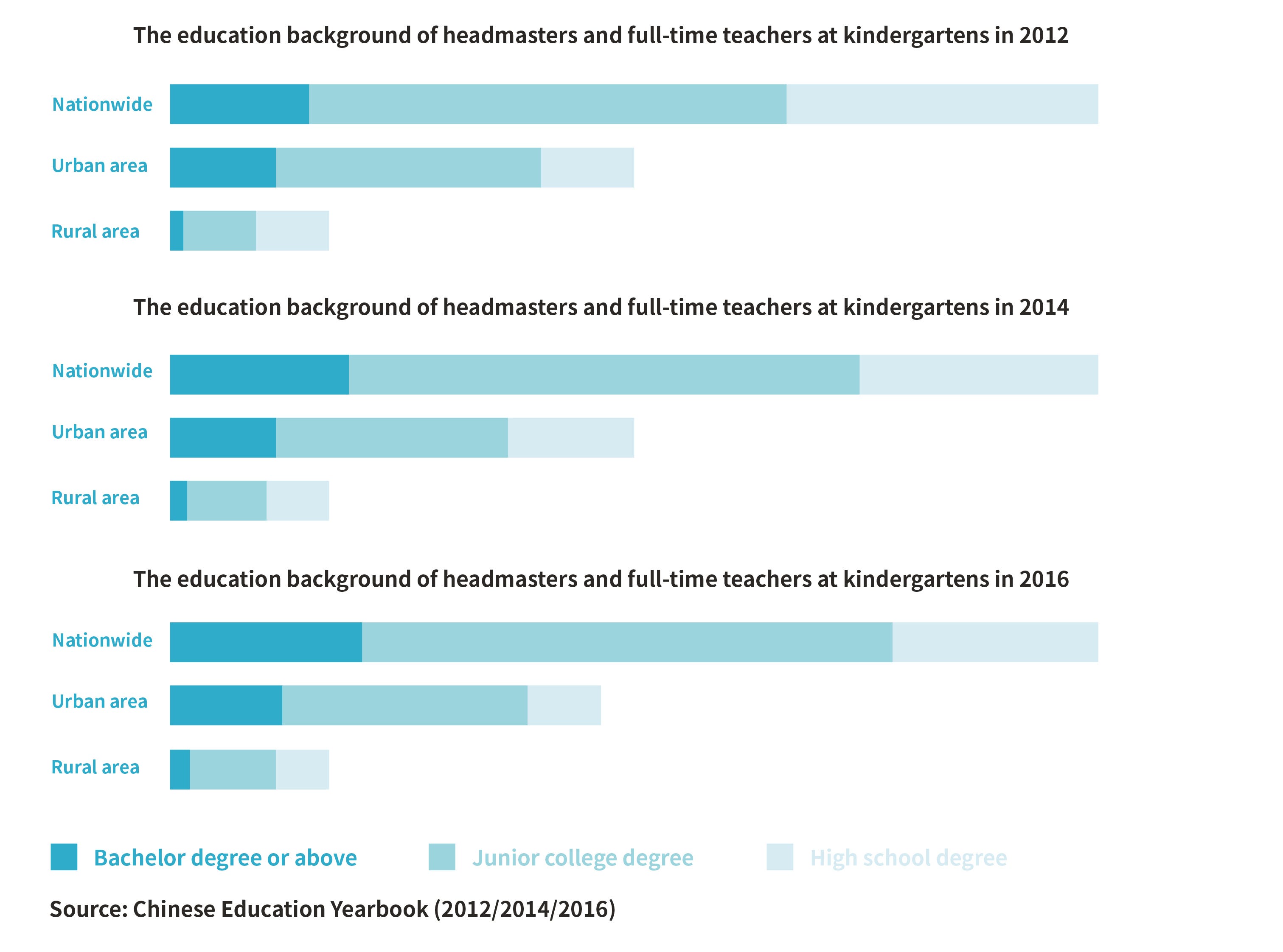China’s Early Childhood Education: Predicament, Policy and Opportunity
Parents in China have been constantly struggling with getting their children enrolled in their dream kindergartens the past decade across urban and rural areas. The long-term challenge which lies in the limited access as well as the high tuition fee of kindergartens poses a threat to China’s early childhood education. Under these circumstances, Chinese government carried out various policies and implemented a range of regulations to address the challenge, some of which are highly effective. However, the predicament regarding facilitating accessible early childhood education and teacher shortage is still striking. Potential opportunities arise with the sector’s challenges.

Access: the lack of “universally-benefit” kindergartens

Based on the fact that China sorely lacks kindergartens, the Ministry of Education formulated the policy to expand and build more kindergartens from 2007 to 2009. In urban area, government encouraged to develop the establishment of kindergartens through the affiliation with community. While in rural area, they expanded original kindergartens within the region and built new ones. This policy contributed to a sharp increase in terms of the total of kindergartens and enrolled children. The gross enrollment rate attained 77.4% in 2016, up more than 30 percentage points from 2007.
However, the surge of kindergartens failed to bring accessible and affordable education. Private kindergartens developed faster than public ones in recent years and represent more than 60% of the total market of kindergarten nationwide, whose tuition fee become a heavy burden for many households. Therefore, Chinese government set the goal that the gross enrollment rate should attain 85% and universally-benefit kindergartens, which meet the standards of local government, charge affordable tuition fees, and guarantee equality of enrollment, account for 80% of the total by 2020. In order to support the advancement of universally-benefit early childhood education resources, specific policy guidance regarding criteria and incentives have been initiated from 2010.
Criteria
For establishing universally-benefit kindergartens and transforming private kindergartens to this type, the institution should meet the following criteria:
be licensed (reach the authorised norms)
charge reasonable tuition fee
offer standard pay and benefits to teachers and staff.
Incentives
The government also proposed incentives to motivate the establishment and transformation from private kindergartens to universally-benefit ones.
They carried out preferential policy for using land. For instance, rent reduction was implemented in Beijing. In addition, special subsidies have been paid which come in various forms. The local government in Beijing allocates the subsidy to the kindergartens if they promise to enrol more students than usual. While in Nanjing, children enrolled are directly granted as a means to reduce the tuition fees they have to pay. Teachers in Ningxia get the subsidy as an extra compensation of their income.
The predicament of access have been largely addressed the past decade in terms of overall development with a prominent feature consisting in the lack of universally-benefit kindergartens.
Teacher shortage
Quantity

Building more kindergartens has not ensured teachers sufficiency. The Ministry of Education asserted that the ratio of teaching/administrative staff and children at full-time kindergarten should reach 1:5–1:7 whereas 1:8–1:10 for half-day kindergarten. The conclusion is clear and known from the Chinese government: the actual ratio is far away from being ideal. Especially with the second-child policy coming into force in 2015, the peak of growing need in early childhood education is expected to come in 2021 with 15 million children in need of enrollment, which will lead to a lack of teachers over 3 million on China’s fundamental education resources allocation.
To tackle this challenge, the Chinese government have adopted a wide range of measures to attract talents in this industry. Overall, the allocation of funds from the Central Finance generate teachers’ motivation. The local government of Ningbo make sure to provide more full-time teacher positions which are officially budgeted by government. This simply means, if they are recruited at these positions, they are unlikely to be dismissed and will be provided with a more stable career path as well as secured welfare plan. Besides, the government also grant special subsidies to teachers. For example, teachers in Tongren are offered higher income and they also receive promoted welfare and benefits plan.
Quality

Kindergarten teachers are not professionally qualified with relatively low education background. 22 percent of kindergarten teachers in China do not have teacher certificates. And this number is even doubled when it comes to rural areas.
The Ministry of Education issued policy to standardise the training of kindergarten teachers and attached great importance to it by setting the goal to make sure all kindergarten teachers have certificates by 2020. The Central Finance specially allocated 1.1 billion RMB (close to 165 million USD) funds in teachers’ training. The investment has been made to develop normal schools and support to set up majors like early childhood education. Since the teachers shortage is more severe in rural area, the local government formulated policy to encourage the establishment of free education to those normal school students who major in early childhood education. The funds were also allocated to optimise kindergarten teachers’ training system by combining training and practice. Normal schools and high-quality kindergartens work together to build teachers training base.
Opportunity
The challenges in terms of access especially the lack of universally-benefit kindergartens as well as teachers shortage actually generate certain market needs. With guidance of the government, potential opportunities arise.
Joint kindergarten establishment
Under the guidance of Chinese government, early childhood education sees the trend of building new models of kindergartens in China. The interest for international education, especially for early childhood years contributes to the development joint kindergarten establishment by China and overseas partner. For instance, the first model kindergarten of Helsinki International School opened in Baotou, North China in 2017, which set a good example for other international institutions to enter Chinese early childhood education.
Online education platform for children
Limited access and teachers shortage also entails the rise of online education platform which could cover a wider range of users. This type of platform integrates various social resources such as freelance teachers. Technology is also largely utilised to facilitate online learning. Lbonline is a very representative platform among them to provide online tutoring catering for children at early childhood years.
Online education resource platform for teachers
The lack of professional qualification motivates many kindergarten teachers to make use of online platforms for teachers where they could refer to the shared resources on teacher training to enrich their teaching practice. More importantly, the platform helps them get to know the kindergarten teacher community for close interaction and networking. For example, Youshikoudai is an app which teachers could download on their mobile devices, enabling them to access to all sorts of education resources and materials also get connected with the community. This greatly benefit their teaching experiences.
The highlighted importance attached to early childhood education by acknowledging the predicament and addressing it with policy guidance led to a hard yet promising outlook for this sector. The challenges on the other hand give rise to potential opportunities concerning market. Going forward, the challenging business of kindergartens still has a long way to go.











